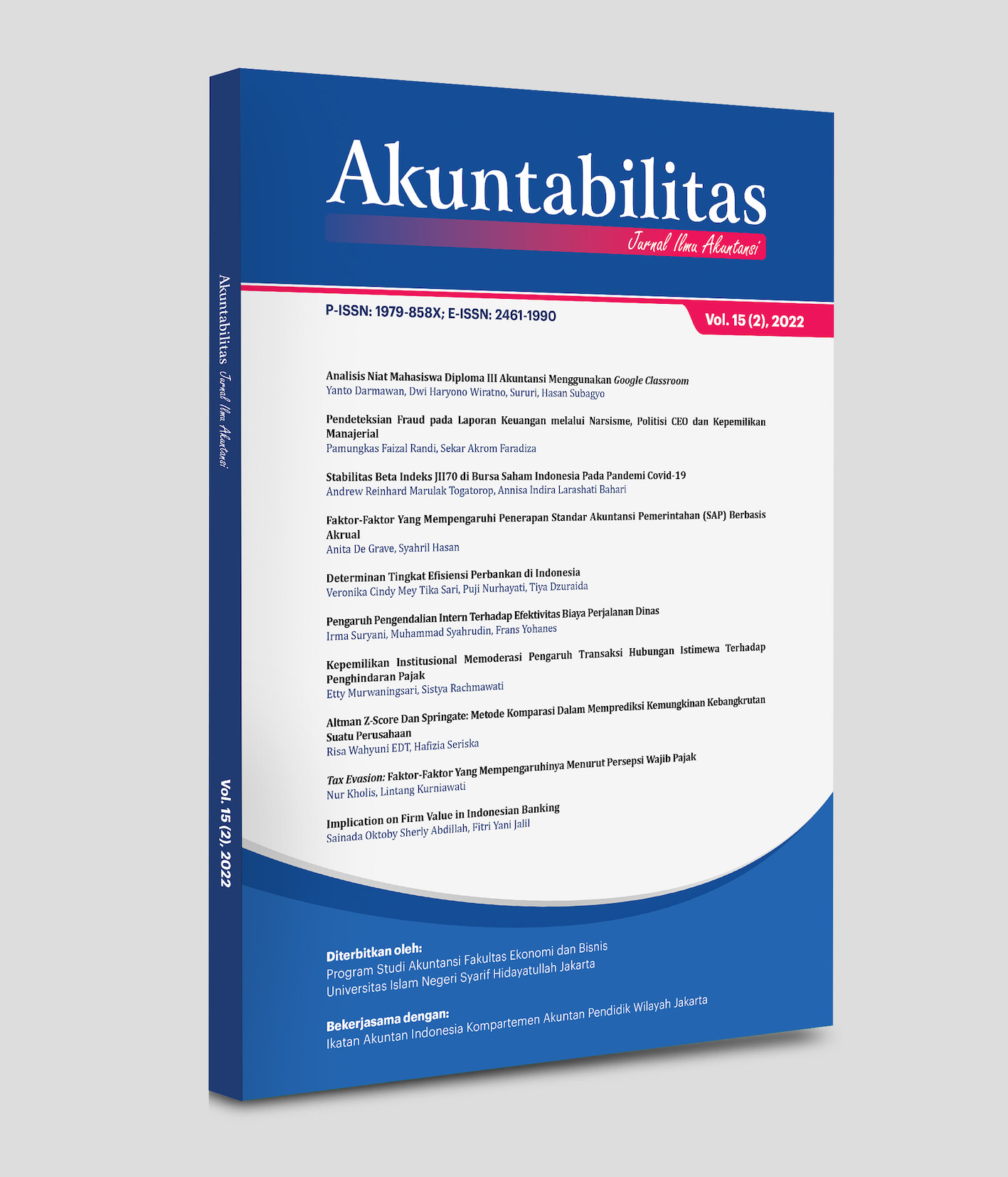Analisis Niat Mahasiswa Diploma III Akuntansi Menggunakan Google Classroom
DOI:
https://doi.org/10.15408/akt.v15i2.28671Keywords:
E-Learning, Google Classroom, Structural Equation Modelling, Partial Least Square, Technology Acceptance ModelAbstract
Google Classroom has become a popular e-learning management system in higher education during the covid-19 pandemic. However, successful implementation of Google Classroom requires acceptance by students. This study aims to explain the factors that influence accounting students’ intention to accept Google Classroom This study uses an Extended the Technology Acceptance Model to assess the acceptance and intention to use Google Classroom. Data was obtained from 326 students of Politeknik YKPN Yogyakarta through online questionnaire using Google Form. The Structural Equation Modelling – Partial Least Square approach is used to assess the measurement model and structural model. This study concludes that 1) perceived ease has no effect on students’ intention to use Google Classroom, 2) perceived of ease Google Classroom has a positive effect on perceived usefulness of Google Classroom, 3) perceived usefulness has a positive effect on students’ intention to use Google Classroom, 4) perceived behavioral control does not affect students’ intentions to use Google Classroom, and 5) subjective norms affect students’ intentions to use Google Classroom.References
Ajzen, I. (2020). The theory of planned behavior: Frequently asked questions. Human Behavior and Emerging Technologies, 2(4), 314–324. https://doi.org/10.1002/hbe2.195
Al-Maroof, R. A. S., & Al-Emran, M. (2018). Students acceptance of google classroom: An exploratory study using PLS-SEM approach. International Journal of Emerging Technologies in Learning, 13(6), 112–123. https://doi.org/10.3991/ijet.v13i06.8275
Ansong-Gyimah, K. (2020). Students’ Perceptions and Continuous Intention to Use E-Learning Systems: The Case of Google Classroom. International Journal of Emerging Technologies in Learning (IJET), 15(11), 236. https://doi.org/10.3991/ijet.v15i11.12683
Cech, P., & Bures, V. (2004). E-learning implementation at University. 3rd European Conference on E-Learning, Rosenberg 2003, 25–34.
Davis, F. D. (1989). Perceived usefulness, perceived ease of use, and user acceptance of information technology. MIS Quarterly: Management Information Systems, 13(3), 319–339. https://doi.org/10.2307/249008
Farida, L. D., & Sismoro, H. (2020). Perbandingan Tingkat Usability Google Classroom Berdasarkan Perspektif Teachers Pada Perguruan Tinggi. Sistemasi, 9(1), 63. https://doi.org/10.32520/stmsi.v9i1.575
Garson, D. G. (2012). Partial Least Squares Regression and Structural Equation Models. Statistical Associates, Asheboro, NC.
Hair, J. F., Ringle, C. M., & Sarstedt, M. (2011). PLS-SEM: Indeed a silver bullet. Journal of Marketing Theory and Practice, 19(2), 139–152. https://doi.org/10.2753/MTP1069-6679190202
Heggart, K. R., & Yoo, J. (2018). Getting the most from google classroom: A pedagogical framework for tertiary educators. Australian Journal of Teacher Education, 43(3), 140–153. https://doi.org/10.14221/ajte.2018v43n3.9
Henseler, J., Ringle, C. M., & Sarstedt, M. (2015). A new criterion for assessing discriminant validity in variance-based structural equation modeling. Journal of the Academy of Marketing Science, 43(1), 115–135. https://doi.org/10.1007/s11747-014-0403-8
Jakkaew, P., & Hemrungrote, S. (2017). The use of UTAUT2 model for understanding student perceptions using Google Classroom: A case study of Introduction to Information Technology course. 2nd Joint International Conference on Digital Arts, Media and Technology 2017: Digital Economy for Sustainable Growth, ICDAMT 2017, April, 205–209. https://doi.org/10.1109/ICDAMT.2017.7904962
Jordan, M. M., & Danielle Duckett, N. (2018). Universities Confront “Tech Disruption”: Perceptions of Student Engagement Online Using Two Learning Management Systems. The Journal of Public and Professional Sociology, 10(1).
Kementrian Pendidikan dan Kebudayaan RI. (2020). Surat Edaran Tanggal 17 Maret tentang Pembelajaran secara Daring dan Bekerja dari Rumah dalam Rangka Pencegahan Penyebaran Corona Virus Disease (COVID-19).
Mathieson, K., Peacock, E., & Chin, W. W. (2001). Extending the Technology Acceptance Model: The Influence of Perceived User Resources. Data Base for Advances in Information Systems, 32(3), 86–112. https://doi.org/10.1145/506724.506730
Mokhtar, R., & Abu Karim, M. H. (2021). Exploring Students Behaviour in Using Google Classroom During Covid-19 Pandemic: Unified Theory of Acceptance and Use of Technology (Utaut). International Journal of Modern Education, 3(8), 182–195. https://doi.org/10.35631/ijmoe.380015
Muderedzwa, M., & Chilumani, K. (2017). The Adoption of Google Classroom at the Catholic University of Zimbabwe. The Fountain: Journal of Interdisciplinary Studies, 1(1), 133–147. http://journals.cuz.ac.zw/index.php/fountain/article/view/39
Surjono, H. D. (2013). Membangun Course E - Learning Berbasis Moodle (Edisi II). UNY Press.
Taylor, S., & Todd, P. (1995). Understanding information technology usage: a test of competing models. Information Systems Research, 6, 144–176. https://doi.org/https://doi.org/10.1287/isre.6.2.14
Wijaya, A. (2016). Analysis of factors affecting the use of google classroom to support lectures. The 5th International Conference on Information Technology and Engineering Application, February, 61–68. http://eprints.binadarma.ac.id/2777/
Yolandari, A., Fithri Meuthia, R., & Fontanella, A. (2020). Penerapan E-Learning ¬Platform Google Classroom Untuk Menjawab Tantangan Revolusi Industri 4.0. Akuntansi Dan Manajemen, 15(2), 141–155. https://doi.org/10.30630/jam.v15i2.114

